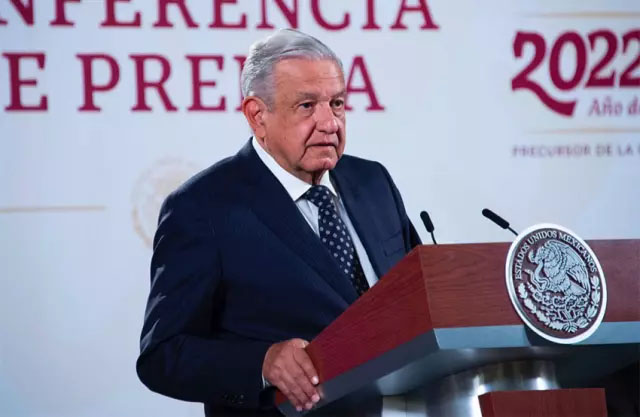President blames US bureaucracy for delays in providing funds to stem migration
by Mexico News Daily
President López Obrador on Tuesday questioned why the United States Congress is taking so long to approve aid for Central American countries when it promptly authorized resources to help Ukraine in its war against Russia.
The United States Senate gave final approval to a US $13.6 billion emergency military and humanitarian aid package for Ukraine earlier this month.
Speaking at his regular news conference, López Obrador said that in a meeting last week with United States Secretary of Homeland Security Alejandro Mayorkas he insisted on the need for the U.S. to support El Salvador, Honduras and Guatemala in order to stem migration.
“Nobody leaves their community, abandons their family for pleasure. They do it out of need,” he said.
“We’ve been saying this for a long time and we’ve been unable to get a favorable response. … We have to attend to the people of Central America, our Central American brothers, so that they have hope of being able to live with dignity, like they deserve,” López Obrador said.
The president noted that Mexico has extended the Sowing Life tree-planting employment program and the Youths Building the Future apprenticeship scheme to Central America before stressing that what his government wants is for the United States to invest in the region as well.
“We’re proposing that Sowing Life and Youths Building the Future be expanded. We’re already helping but of course we don’t have enough resources,” he said.
The Mexican and U.S. governments announced a new framework for development cooperation in Guatemala, Honduras and El Salvador late last year, but López Obrador said the approval of U.S. funding for Central America has been stalled for four years.
The U.S. Congress “just authorized resources for Ukraine and that’s fine because it’s their policy to protect Ukraine, they’ve decided that,” he said.
“… The United States Congress approved it in two days, I believe, but the support for our Central American brothers hasn’t been approved in four years,” López Obrador said.
“That’s what [Mayorkas and I] spoke about. And it’s not just about employment in Central America but also … the possibility of [Central Americans] obtaining temporary work visas [for the United States], putting migration flows in order, really changing migration policy,” he said.
AMLO also questioned why a commitment to regularize the migratory status of more than 10 million Mexicans who “live and work honestly in the United States” hasn’t been acted upon.
“Why is this initiative stalled in the Congress? Isn’t it important? Why don’t they approve the resources for Central America?” he asked.
“I saw what was approved for Ukraine. … With all respect, it was an amount much greater than what’s needed to support the poor people of Central American and Caribbean countries,” López Obrador said.
Hilton plans to open 15 new hotels in Mexico this year
The US chain hopes to have 200 hotels in Mexico in the long term
The U.S. hotel chain Hilton plans to open 15 new hotels in Mexico this year, taking its total offering in the country over 100.
Mexico is Hilton’s fifth most important country and the chain has long term plans to expand its offering to 200 hotels. The initial investment will create some 25,000 direct and indirect jobs, the company said.
The new developments will be in Zacatecas city; Guadalajara, Jalisco; Monterrey, Nuevo León; Mexico City; Tijuana, Baja California; and Saltillo and Torreón in Coahuila.
There will also be new hotels built in the tourist centers of San Miguel de Allende, Guanajuato; Tulum, Quintana Roo; Nuevo Vallarta, Nayarit; and La Paz, Baja California Sur.
The vice president of development for Latin America and the Caribbean, Juan Corvinos, said Mexico is a region Hilton is focused on.
“Our prospects for Mexico are very good … We have aggressive growth plans. We will have these 15 hotels before the end of the year, we have many openings scheduled,” he said.
Corvinos added that the investment would provide an economic boost in the areas around the new sites.
“Peripheral businesses are generated through [the hotels]. Not only do we need employees in the hotels, but there is a whole productive chain that has to provide the fruit, wine and vegetables. All those products generate wealth in the locale,” he said.
Corvinos confirmed that investment would not stop at the 100 mark.



